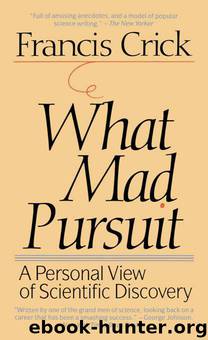What Mad Pursuit by Francis Crick

Author:Francis Crick [FRANCIS CRICK]
Language: eng
Format: epub, mobi
Tags: History, Non-Fiction, Science, Biography
ISBN: 9780465091386
Publisher: Basic Books
Published: 1988-01-01T00:00:00+00:00
9
Fingerprinting Proteins
IN THE LAST CHAPTER I discussed the various theoretical attempts to solve the coding problem. In this one I describe some experimental approaches. The problem was much the same as before: Do genes (DNA) control the synthesis of protein? And if so, how?
It seems obvious enough now that the amino acid sequence of a protein is determined genetically, and in particular by the base sequence of a stretch of DNA (or RNA), but this was not always so clear. After the double helix was discovered the idea seemed much more attractive, so much so that Jim and I began to take it for granted. The next step was to show that the gene and the protein it coded were co-linear. By this I mean that the sequence of bases in that stretch of nucleic acid was in step with the corresponding sequences of amino acids in the particular protein it coded, just as a stretch of Morse code is co-linear with the corresponding message in English.
In those days there seemed no hope of sequencing either DNA or RNA directly, but in favorable circumstances we thought it might be possible to order a set of mutants within one gene, using standard genetic methods. Since the genetic distances were likely to be rather small, the recombination rates involved were expected to be much less than those geneticists usually measured. This implied that many progeny would have to be examined, suggesting that it would be necessary to use some sort of microorganism, such as a bacterium or a virus.
Once the mutants had been put in order, the next step would be to pin down the amino acid change due to each mutant. Although sequencing a protein chain was then still laborious, Fred Sanger had shown that it could be done, and we expected that for a small protein it would not be impossibly difficult.
Some time in the summer of 1954 I was sitting on the grass at Wood’s Hole, explaining these ideas to the Polish geneticist Boris Ephrussi. Boris, by then working in Paris, had been particularly interested in genes in yeast that appeared to be outside the nucleus of the cell. We know now that such cytoplasmic genes are coded in the DNA of the cell’s mitochondria, but at that time all that was known was that they did not behave like nuclear genes. Boris was indignant. “How do you know,” he asked, “that the amino acid sequence is not determined by a cytoplasmic gene and that all the nuclear genes do is to fold up the protein correctly?”
I don’t think Boris necessarily believed this (and certainly I did not), but his question made me realize that we first needed to show that a single mutant in a nuclear gene altered the amino acid sequence of the protein for which it coded, probably changing just a single amino acid. On returning to Cambridge I decided that this was the next most important step to take.
It was not at all clear what organism to use nor what protein to study.
Download
This site does not store any files on its server. We only index and link to content provided by other sites. Please contact the content providers to delete copyright contents if any and email us, we'll remove relevant links or contents immediately.
| Fossils | Game Theory |
| Genetics | Molecular Biology |
| Organic | Paleontology |
Sapiens: A Brief History of Humankind by Yuval Noah Harari(14371)
Sapiens by Yuval Noah Harari(5366)
Pale Blue Dot by Carl Sagan(4996)
Homo Deus: A Brief History of Tomorrow by Yuval Noah Harari(4909)
Livewired by David Eagleman(3765)
Origin Story: A Big History of Everything by David Christian(3687)
Brief Answers to the Big Questions by Stephen Hawking(3430)
Inferior by Angela Saini(3311)
Origin Story by David Christian(3195)
Signature in the Cell: DNA and the Evidence for Intelligent Design by Stephen C. Meyer(3132)
The Gene: An Intimate History by Siddhartha Mukherjee(3095)
The Evolution of Beauty by Richard O. Prum(2993)
Aliens by Jim Al-Khalili(2827)
How The Mind Works by Steven Pinker(2813)
A Short History of Nearly Everything by Bryson Bill(2689)
Sex at Dawn: The Prehistoric Origins of Modern Sexuality by Ryan Christopher(2528)
From Bacteria to Bach and Back by Daniel C. Dennett(2483)
Endless Forms Most Beautiful by Sean B. Carroll(2478)
Who We Are and How We Got Here by David Reich(2433)
